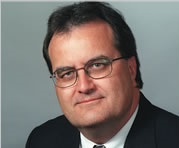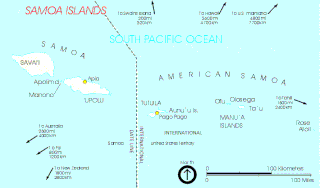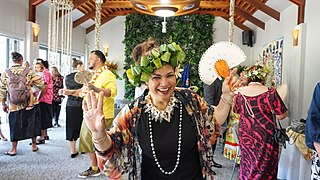
Samoa, officially the Independent State of Samoa and until 1997 known as Western Samoa, is a Polynesian island country consisting of two main islands ; two smaller, inhabited islands ; and several smaller, uninhabited islands, including the Aleipata Islands. Samoa is located 64 km (40 mi) west of American Samoa, 889 km (552 mi) northeast of Tonga, 1,152 km (716 mi) northeast of Fiji, 483 km (300 mi) east of Wallis and Futuna, 1,151 km (715 mi) southeast of Tuvalu, 519 km (322 mi) south of Tokelau, 4,190 km (2,600 mi) southwest of Hawaii, and 610 km (380 mi) northwest of Niue. The capital and largest city is Apia. The Lapita people discovered and settled the Samoan Islands around 3,500 years ago. They developed a Samoan language and Samoan cultural identity.

Territories of the United States are sub-national administrative divisions overseen by the federal government of the United States. The various American territories differ from the U.S. states and Indian reservations as they are not sovereign entities. In contrast, each state has a sovereignty separate from that of the federal government and each federally recognized Native American tribe possesses limited tribal sovereignty as a "dependent sovereign nation." Territories are classified by incorporation and whether they have an "organized" government through an organic act passed by the Congress. American territories are under American sovereignty and, consequently, may be treated as part of the United States proper in some ways and not others. Unincorporated territories in particular are not considered to be integral parts of the United States, and the Constitution of the United States applies only partially in those territories.

The Human Rights Protection Party is a Samoan political party. It was founded in 1979 and dominated Samoan party politics for decades thereafter, leading every government until their defeat in 2021.

Mark James Gosche is a New Zealand politician. He is a member of the Labour Party. He was born in Auckland to Samoan parents, and has been active in New Zealand's Pasifika community.

The Samoa All People's Party (SAPP) was a political party in Samoa. It was formed on 24 March 1996, by former Human Rights Protection Party MP Matatumua Maimoaga, who became Samoa's first female political party leader. The party was notable for its internal equality, allowing people as young as 16 and of both genders to hold internal party positions.

The Samoan National Development Party (SNDP) was a political party in Samoa, and the country's main opposition party between 1988 and 2003.

The Samoan Conservative Progressive Party (SCPP) was a political party in Samoa. The party was established in June 1995 by Leota Itu'au Ale, former deputy leader of the Samoan National Development Party after a disagreement over the party's leadership. The SCPP supported the incumbent Human Rights Protection Party government.
Matatumua Maimoana (1935–2012), also known as Matatumua Maimoaga Vermeulen, was a matai, politician, Nurse and Environmentalist of Samoa. Her chief title, Matatumua, was an orator's title from the village of Faleasiu. She was a former member of parliament in Samoa and the founder of the Samoa All People's Party (SAPP), becoming the first woman to lead a political party in the country. SAPP allowed people as young as 16, regardless of gender or whether they were matai to be officers in the organisation which included village branches. She was a founding member of the Human Rights Protection Party (HRPP), which has dominated Samoan politics in the last two decades.

The prime minister of the Independent State of Samoa is the head of government of Samoa. The prime minister is a member of the Legislative Assembly, and is appointed by the O le Ao o le Malo for a five-year term. Since independence in 1962, a total of seven individuals have served as prime minister. The incumbent was disputed due to the 2021 constitutional crisis, when Tuila'epa Sa'ilele Malielegaoi refused to accept the results of the 2021 general election. On 23 July 2021, the Samoan Court of Appeal ruled that the Faʻatuatua i le Atua Samoa ua Tasi (FAST) party had been in government since 24 May. Tuila'epa then conceded defeat, resulting in FAST party leader Fiamē Naomi Mataʻafa becoming prime minister.

General elections were held in Samoa on 2 March 2001 to determine the composition of the 13th Parliament. Prime minister Tuilaʻepa Saʻilele Malielegaoi led the Human Rights Protection Party (HRPP) into the election. Opposition leader and former prime minister and future head of state, Tui Ātua Tupua Tamasese Efi led the Samoan National Development Party (SNDP) into the election. The HRPP won 23 seats, but initially fell short of a majority. The SNDP won 13 seats, the Samoan United People's Party secured one seat and the remaining 12 were won by independents. Following the election, all 12 independents joined the HRPP, giving the party a majority in parliament and allowing Tuila'epa to remain prime minister.

The Western Samoa Labour Party (WSLP) was a political party in Samoa. It was founded on June 4, 1993, by To'alepai Toesulusulu Si'ueva, a former Minister of Health in the 1985 - 88 coalition government. The party opposed the HRPP and the 1991 constitutional amendment which saw the term of the Fono extended from three to five years.

The Temokalasi Samoa Faʻamatai or Samoan Democracy of Matai (TSFPP) was a political party in Samoa. It was founded in January 1993 by Le Tagaloa Pita. The party opposed universal suffrage and argued that only matai should have the vote. It also opposed the introduction of value-added goods and services tax to Samoa.

The Samoan United Independents Political Party (SUIPP) was a political party in Samoa. The party was formed in the wake of the 2001 election, when 12 independent MPs grouped together. The party later combined with the Samoan National Development Party to form the Samoan Democratic United Party.

American Samoa is an unincorporated territory of the United States located in the South Pacific Ocean, southeast of the island country of Samoa. Centered on 14.3°S 170.7°W, it is east of the International Date Line and the Wallis and Futuna Islands, west of the Cook Islands, north of Tonga, and some 500 kilometers (310 mi) south of Tokelau. American Samoa is the southernmost territory of the United States and one of two U.S. territories south of the Equator, along with the uninhabited Jarvis Island.
Le Tagaloa Pita is a high chief matai and a former Member of Parliament of Samoa. He is a matai from the village of Sili on the island of Savai'i and has an honorary doctorate from Drew University in the United States. During his political career, he was a member of the Human Rights Protection Party (HRPP) and a cabinet minister with the portfolios of economic affairs and post office.

This is an English language bibliography of American Samoa and its geography, history, inhabitants, culture, biota, etc.

The Constitution of Samoa is a written constitution which is the supreme law in Samoa. It establishes Samoa as a parliamentary republic with a Westminster system and responsible government. It outlines the structure and powers of the Samoan government's three parts: the executive, legislature, and judiciary.
Seumanu Aita Ah Wa was a Samoan politician and former Cabinet Minister. He was a member of the Human Rights Protection Party.
Tufuga Samuelu Atoa OM was a Samoan civil servant, educator, and sports administrator. He was chair of Western Samoa's Public Service Commission and managed Western Samoa's team at the 1996 Summer Olympics.

Pasifika New Zealanders are a pan-ethnic group of New Zealanders associated with, and descended from, the indigenous peoples of the Pacific Islands outside of New Zealand itself. They form the fourth-largest ethnic grouping in the country, after European-descended Pākehā, indigenous Māori, and Asian New Zealanders. There are over 380,000 Pasifika people in New Zealand, with the majority living in Auckland. 8% of the population of New Zealand identifies as being of Pacific origin.








